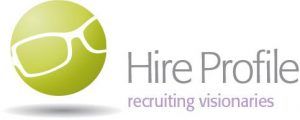

 Nancy Gamble brings people together. She uses her connective superpowers for good as the founder and CEO of Hire Profile Inc., a certified woman-owned business. This former California girl got her Marketing degree from CSU Long Beach, then worked in Los Angeles, London, and Atlanta where she lead the Creating Staffing Team at Aquent.
Nancy Gamble brings people together. She uses her connective superpowers for good as the founder and CEO of Hire Profile Inc., a certified woman-owned business. This former California girl got her Marketing degree from CSU Long Beach, then worked in Los Angeles, London, and Atlanta where she lead the Creating Staffing Team at Aquent.
Strong industry vision and general bad-assery led Nancy to launch Hire Profile in 2003. When she’s not matching Atlanta’s top creative talent with its leading creative and marketing employers, Nancy is a NPCC volunteer and chairs the AIESEC Life National Mentorship Program. She lives in Alpharetta with her husband, and their rescue dachshund mix, Scruffles.
Connect with Nancy on LinkedIn and follow Hire Profile on Facebook and Twitter.
![]() This transcript is machine transcribed by Sonix
This transcript is machine transcribed by Sonix
TRANSCRIPT
Intro: [00:00:04] Broadcasting live from the Business RadioX studios in Atlanta, Georgia, it’s time for GWBC Radio’s Open for Business. Now, here’s your host.
Lee Kantor: [00:00:18] Lee Kantor here. Another episode of the GWBC Open for Business. And this will be a fun one. I have with me today Nancy Gamble. And she’s with a company called Hire Profile. Welcome, Nancy.
Nancy Gamble: [00:00:31] Thank you for having me.
Lee Kantor: [00:00:34] Well, before we get too far into things, tell us about Hire Profile. How do you serve your clients?
Nancy Gamble: [00:00:41] Hire Profile is a staffing and recruiting agency. And we specialize in the marketing, advertising, graphic design and public relations fields. We help our clients who are either corporate marketing departments, design studios, ad agencies, production companies find freelancers to help them in a pinch, cover long-term contracting needs, and also permanent searches for their employee.
Lee Kantor: [00:01:07] And how did you get into this line of work?
Nancy Gamble: [00:01:10] Well, interesting story, I am a Southern California native. I was living and working in Los Angeles in the advertising industry at BBDO and some other agencies out there, and Saatchi & Saatchi, Team One, and decided after a visit to Atlanta that that was home, and I just missed my calling somehow and had to get out here. So, I moved out here, and I was recruited by a company to start their kind of high-end creative division of their existing company to recruit and serve the advertising industry. So, my past experience made me a good fit, and they taught me recruiting, and I have never looked back. I decided to start my own firm in 2003 and have been at it ever since.
Lee Kantor: [00:01:59] Now, how does somebody get on your radar? How do you find the talent you need for the companies you serve?
Nancy Gamble: [00:02:09] Great question. Multipronged approach, of course. There’s no one source that covers everything that we would look for in a week, a month or a year. But number one is referrals. We take our referrals very seriously if we have either a client or existing candidate, someone we know through business colleagues that says, “You need to talk to this person,” I can guarantee you that we will talk to them.
Nancy Gamble: [00:02:34] Then, the next would be, obviously, we have collected over a very deep pool of existing freelancers who, sometimes, we call permalancers. They’re always kind of on the hunt for their next gig. And so, they are a very reliable resource for us. We have job seekers that are in between jobs. They might see our posting on our social media, they might connect on LinkedIn, and then we invite them to apply. And then, of course, we go out and we headhunt from companies in the right industry for what our clients are looking for and with the skills that we need. Of course, we use all the tools. Everyone knows about LinkedIn, Indeed, things like that. But I would say that our number one is those personal relationships and those custom referrals. That’s what we spend most of our time generating.
Lee Kantor: [00:03:25] And then, what are the trends you’re seeing during this pandemic? Are people hiring now? Are people like on pause? What is kind of the state of the industry as you see it? Because I would imagine you’re kind of-
Nancy Gamble: [00:03:35] Oh, that-
Lee Kantor: [00:03:35] You’re getting the first look, right? You’re that the headlights on this thing.
Nancy Gamble: [00:03:40] Yeah. We, oftentimes, are. This is my second big disaster. If you count 9/11, I guess it’s the third. But obviously, the economic recession, the financial one is acting in a very similar way in that the first people to often be cut are the existing contractors. They boil things down to their core W2 staff. However, then, they realized that work still needs to go on, and they start slowly adding back contractors. That, usually, is the first line of defense in that they don’t really want to jump in with full-time W2 employees when they’re unsure and uncertain of their own future. So, they may say, “Well, let’s start with a part-time contract. We’ll get a consultant on this project.”
Nancy Gamble: [00:04:30] So, if somebody is looking for work at this time, you need to really be versed on how you want to market yourself as a consultant, or contractor, or the gig economy, be part of that. Know what you’re worth. Know what they’re going rates are. Talk to someone like myself, or a recruiter, or hiring manager to kind of get a feel for what people in your line of work are getting per hour.
Nancy Gamble: [00:04:57] So, yes, contacting will probably be the first thing that will ramp up, but I will say, companies are hiring. They had holes in their team before this started. Obviously, some industries are doing great in this economy, and some are just not as affected by downturn as they are by having to accommodate working from home and figuring all that out. But I feel like we’re past that point now. Those companies have now kind of figured this out, and they’re ready to get back to work.
Lee Kantor: [00:05:28] Now, what type of skills are you seeing that people need during this time?
Nancy Gamble: [00:05:34] Digital. Digital skills. Now, of course, we’re in a narrow market, so we are not involved in finance, and nurses, and all these other areas. But within the marketing and advertising design, a lot of communications, a lot of digital content, and digital project management. Just digital marketing, management. How to not only enhance but increase the flow and the clicks for their online presence because a lot of companies that no longer operate or have very limited access to a brick and mortar way to sell their products are really ramping up their e-commerce, and making sure their websites are up to date, and ready to receive a lot of traffic, and create those messages that may need to go out to their customers, explaining how things are going to be different now and in the future. So, communications and digital are really key areas right now.
Lee Kantor: [00:06:32] Now, in your world, do you hire a lot of … are your workers remote workers? So, they’ll kind of seamlessly fit into this during this transition, or they have to be face-to-face in an office?
Nancy Gamble: [00:06:46] That has really helped us in the fact that most of our … not most. I was a good percentage of our contractors were already at home when this hit. Those that had to transition to being at home for the first time had to work it out, and be flexible, and really show a lot of initiative and extra communication because these companies that always required workers to be onsite were learning as they were growing. So, they were learning it together and figuring it out together. And it made them, I think … actually, their bond is really close.
Nancy Gamble: [00:07:24] The companies that have fought this for many, many years – working from home – have kind of had to come to accept it. And I do believe that many are realizing that this is a very viable way to run your business and that this could be what their future looks like whole or in part as they figure out how to either scale back their commercial office space, they may decide to put their teams on rotation where there could be a blue team and a red team, and the blue team is Monday and Wednesday, and the other team is Tuesday and Thursday, and everybody’s home on Friday. They have to spread their desks. They might be putting up Plexiglas. They just may not be able to do everything the way they used to. And these freelancers, and contractors, and W2 employees are having to go with the flow and really adapt to whatever environment they’re put in.
Lee Kantor: [00:08:22] Now, in your organization, when this went down, was there a big kind of transition for you? Or it sounds like your business kind of can adapt to this situation pretty easily based on what you do and how you do it.
Nancy Gamble: [00:08:39] Well, to say we’re completely unaffected is not accurate. However, already since 2003, we have been a work-from-home business. So, as far as our work environment, our communication tools, and our way of communicating with each other with our client has not changed. So, for us, very minimal impact there. Obviously, we’ve had some business downturn. I would be lying if I said some clients haven’t had to cancel a search or, at least, put it on hold, and we have a couple contractors who were released. But for the most part, we have stayed very steady. In fact, we had some upticks in our contract work. And so, we are secure, and safe, and so happy for that.
Nancy Gamble: [00:09:23] I would say the future is still unknown. We hope that people now that Georgia, at least, is on the cutting edge of opening up, we are hopeful that business will return to normal, and we can all get back to what we love to do and find people big, and wonderful, new opportunities and jobs. We’re spending a lot of our time right now helping candidates that are furloughed and laid off to improve their resumé, to guide them, have them be prepared. We’re giving talks on being prepared for the recovery, job searching in a tough time, and things like that. So, we’re trying to reach out and help as much as we can.
Lee Kantor: [00:10:02] Now, are you seeing a shift in the marketing messaging that’s happening now in terms of companies? Maybe at one point, it was a lot of, “Hey, buy my staff.” And now, it’s more of, “Hey, we’re all going through this tough time together and we’re here to help.” Like, are you seeing a shift in the messaging?
Nancy Gamble: [00:10:19] Absolutely. And those that don’t shift are standing out like really sore thumb. So, the shift is not only a trend. It’s like people who don’t shift to, “We’re here for you. We care. We want you to be well over anything else,” those people are really going to damage their brand because they didn’t shift. So, we really encourage all businesses to not be silenced. That’s another thing that is happening in some cases. Some people don’t know what to say and feel that if they’re not selling their products, what else are they going to talk about?
Nancy Gamble: [00:11:00] So, you have to not only come up with what you want to say to your existing clients, and prospects, and any of your other stakeholders, but let them know that you are still here, that you’re going to be here when they’re ready, and that you actually care about them. And those types of messaging makes key … excuse me. Key communication people within your organization are very vital right now because that messaging is maybe all you have until business starts to boom. So, it’s a really important thing, having your crisis communication linked into your organization and be ready. We don’t know. This could all happen again, and it could be a deja vu. So, be ready with how you want to communicate to your prospects and customers.
Lee Kantor: [00:11:50] Now, talk about GWBC. How has that organization helped your business?
Nancy Gamble: [00:11:58] Oh, GWBC has always been something that we are certified with and been a very important part. It’s a great door opener for getting into large corporations to value a diversity program. And they also put a lot of learning and training out of their members. Obviously, things like this are unique to GWBC. And so, we are our proud members. And I think the fact that most people are really looking at their networks, and they’re looking at the connection and the human connection they’ve made over the years will make organizations like GWBC a vital part of your business plan going forward because you can pick up the phone, and call them, and that you sat with at several luncheon, and be able to say, “Hey, I’m struggling right now. I need to talk to a few women who own businesses. How can we get together?” And I think that that network is there for you, and you don’t realize how important it is until you don’t have it when you go through something like COVID-19.
Lee Kantor: [00:13:03] Now, Nancy, if somebody wanted to learn more and have more substantive conversation with you or somebody on your team, is there a website?
Nancy Gamble: [00:13:12] Sure. You can go to www.hire-profile.com.
Lee Kantor: [00:13:18] Well, good stuff. Thank you so much for sharing your insights and your story today.
Nancy Gamble: [00:13:24] My pleasure. I love what you do. Keep doing it.
Lee Kantor: [00:13:28] Thank you. All right. This is Lee Kantor. We’ll see you all next time on GWBC’s Open for Business.
About Your Host
 Roz Lewis is President & CEO – Greater Women’s Business Council (GWBC®), a regional partner organization of the Women’s Business Enterprise National Council (WBENC) and a member of the WBENC Board of Directors.
Roz Lewis is President & CEO – Greater Women’s Business Council (GWBC®), a regional partner organization of the Women’s Business Enterprise National Council (WBENC) and a member of the WBENC Board of Directors.
Previous career roles at Delta Air Lines included Flight Attendant, In-Flight Supervisor and Program Manager, Corporate Supplier Diversity.
During her career, she has received numerous awards and accolades. Most notable: Atlanta Business Chronicle’s 2018 Diversity & Inclusion award; 2017 inducted into the WBE Hall of Fame by the American Institute of Diversity and Commerce and 2010 – Women Out Front Award from Georgia Tech University.
She has written and been featured in articles on GWBC® and supplier diversity for Forbes Magazine SE, Minority Business Enterprise, The Atlanta Tribune, WE- USA, Minorities and Women in Business magazines. Her quotes are published in The Girls Guide to Building a Million Dollar Business book by Susan Wilson Solovic and Guide Coaching by Ellen M. Dotts, Monique A. Honaman and Stacy L. Sollenberger. Recently, she appeared on Atlanta Business Chronicle’s BIZ on 11Alive, WXIA to talk about the importance of mentoring for women.
In 2010, Lewis was invited to the White House for Council on Women and Girls Entrepreneur Conference for the announcement of the Small Business Administration (SBA) new Women-Owned Small Business Rule approved by Congress. In 2014, she was invited to the White House to participate in sessions on small business priorities and the Affordable Care Act.
Roz Lewis received her BS degree from Florida International University, Miami, FL and has the following training/certifications: Certified Purchasing Managers (CPM); Certified Professional in Supplier Diversity (CPSD), Institute for Supply Management (ISM)of Supplier Diversity and Procurement: Diversity Leadership Academy of Atlanta (DLAA), Negotiations, Supply Management Strategies and Analytical Purchasing.
Connect with Roz on LinkedIn.
About GWBC
The Greater Women’s Business Council (GWBC®) is at the forefront of redefining women business enterprises (WBEs). An increasing focus on supplier diversity means major corporations are viewing our WBEs as innovative, flexible and competitive solutions. The number of women-owned businesses is rising to reflect an increasingly diverse consumer base of women making a majority of buying decision for herself, her family and her business. 
GWBC® has partnered with dozens of major companies who are committed to providing a sustainable foundation through our guiding principles to bring education, training and the standardization of national certification to women businesses in Georgia, North Carolina and South Carolina














